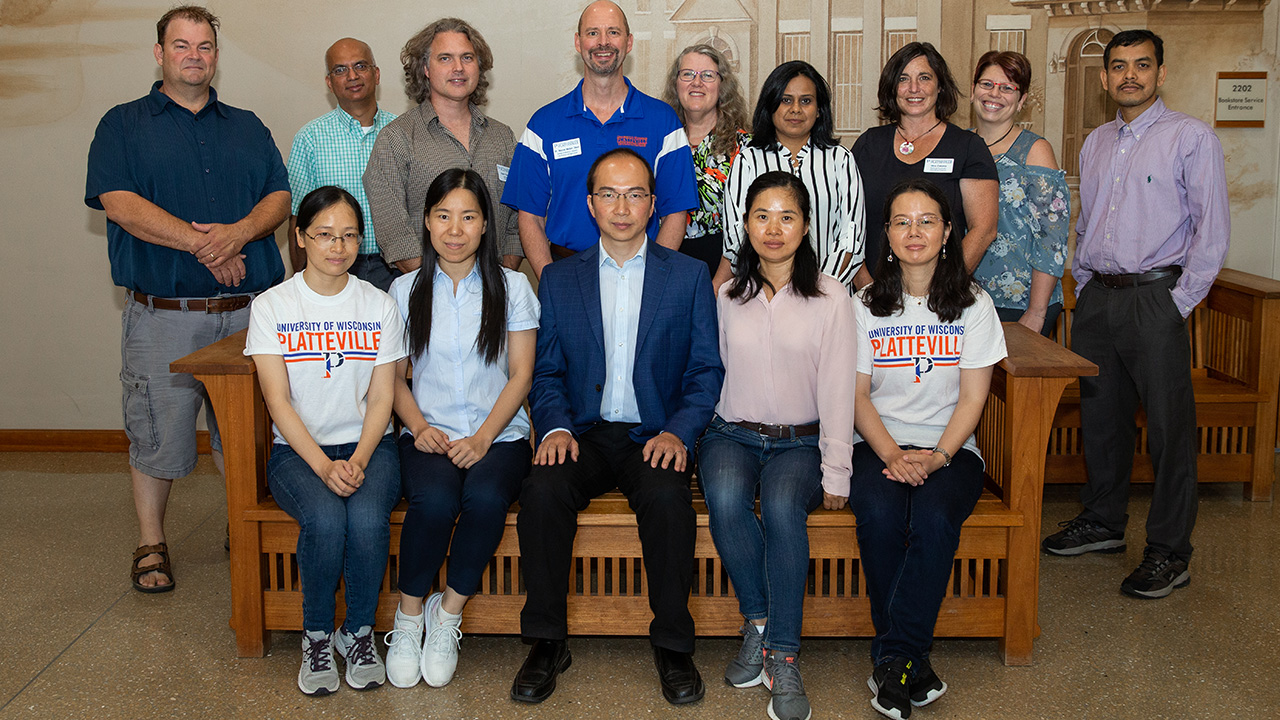
The University of Wisconsin-Platteville hosted five scholars from the South-Central University for Nationalities in Wuhan, China, as part of a cultural exchange program. The six-month program, which wraps up this week, provides the scholars an opportunity to participate in intensive language study, observe UW-Platteville classes and engage in cultural activities.
This year’s cohort followed a successful inaugural program in 2018, in which UW-Platteville hosted a group of six visiting chemistry scholars from the same institution. This year’s scholars represent a range of academic disciplines, including public administration, inorganic chemistry, pharmaceutical analysis, botany and biomedical engineering. The primary goal of the program, according to Dr. Farzana Marni, lecturer in UW-Platteville’s chemistry department and coordinator of the cultural exchange program, is to develop a bilingual English-Chinese program at the South-Central University for Nationalities.
The scholars expressed a range of goals they had for participating in the program, including improving their English language and exploring new pedagogical methods and teaching strategies.
“UW-Platteville has a lot of good teachers, so I came here wanting to study more teaching pedagogies, teaching methods and do some syllabus assessments,” said Dr. Li Liu, an associate professor of public administration. “As a teacher, I think you should open your eyes. Coming to Platteville is my first time coming to America, so it’s a very precious experience for me. I have seen and understand much more cross-culture, and I think this all can help me in my future bilingual course – not only the bilingual course but also my general course.”
The other scholars agreed, several of them adding that, as teachers, it is their responsibility to expand their horizons.
“I want to broaden our students’ view to outside of China and help to communicate ways people are all over the world,” said Dr. Xianghong Li, an associate professor of inorganic chemistry. “As a teacher, the first thing we should do is enhance ourselves and make ourselves more competent.”
Coming from Wuhan, China, which is home to more than 10 million people, life in Platteville was an adjustment – especially when they arrived in February.
“The weather is very cold, but the people are very warm-hearted,” said Dr. Han Cheng, associate professor of pharmaceutical analysis, reflecting on her first impressions.
“Most people never mind people asking questions,” added Dr. Hong Liu, associate professor of botany. “They are very kind and the teachers, Farzana [Marni] and Sharon [Klavins], are very kind and have helped us, not only with teaching programs but with life.”
A portion of the cultural exchange program, coordinated by Dr. Sharon Klavins, professor of biology at UW-Platteville, focused on teaching the scholars U.S. pedagogy strategies. The scholars remarked on the pedagogies and teaching strategies they learned that they will take back to the South-Central University for Nationalities – from semi-flipped classroom concepts to more interactions between students and faculty and more collaborative work among students.
The scholars and UW-Platteville program coordinators agreed that the program was a success. “I think we will bring the friendship between us and bring the great memory of this great city and amazing people to China,” remarked Dr. Zhi Li, a lecturer of biomedical engineering.
“What I have noticed is that when the scholars first came, when you asked them a question they felt very shy to answer, but by the end of the program if you ask them a question, they are very fluent and enthusiastic to answer, which is one of the successes of the program to me,” said Marni.
Klavins agreed, adding, “They worked so hard; we met every week for four hours – two hours at a time. That’s two hours of communicating in a non-native language. They are amazing, and it’s been such an honor and pleasure to work with them all.”